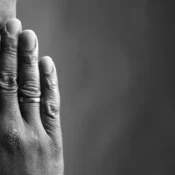My Struggle With Guilt in Grief:
Things I wished I did differently, more or better
Dealing with grief opened my eyes to a range of emotions. One of them was immense and intense guilt feelings. Here’s my experience of dealing with guilt.
One thing I’ve learned about grief is that it cannot be rushed. Your feelings and emotions cannot be bottled in…at least for long. The storm needs to rage.
The hurt needs to be expressed. As the author, John Green, wrote, “That’s the thing about pain. It demands to be felt.” Just like when you hit your big toe against a stone or when you accidentally bite your tongue.
Someone described the death of a loved one as the feeling of reaching out for someone who has always been there, only to find that when you need them one more time, they are no longer there. Our loved ones death forces us on a grief journey which is more or less a process and not a destination. I find my journey through grief riddled with every emotion there is and sometimes I feel them all at the same time.
I have shared some of the emotions with you: fear and anxiety, envy, loneliness, and today let me take you on a journey through my grief-related guilt.
So you’re wondering, what is guilt?
Guilt is one of our distinctive responses to an opinion that we’ve somehow failed in our obligations and commitments or that we’ve done something wrong. It produces an entire combination of feelings including doubt, shame, inadequacy, insecurity, failure, unworthiness, disappointment, self-judgment and blame, anxiety, and fear of punishment
I feel like the death of a loved one compels us to live with circumstances that we would love to change, but sadly we cannot. When a loss occurs, a person experiences grief. Grief is the entire range of naturally occurring human emotions that accompany loss. Sadly, it is a normal and natural reaction to loss.
We often think about what we can do and how to overcome any challenge we face in life, but when a loved one dies, there is absolutely nothing we can do to change the outcome. We are left with questions, questions about what do we do when there is nothing we can do?
One of our many responses to circumstances when there is nothing we can do is to feel guilty because we naturally prefer to feel guilty than feel helpless.
Why did I feel guilty in grief?
Since my wife, Chidinma had now died, I kept thinking about how I would be able to face the years of guilt and happiness which lie ahead.
I kept thinking, if only she wasn’t discharged from the hospital the first time, since there was one more test that they were going to do and later didn’t think it was necessary. If only I had taken her back to the hospital when she had the migraine the day after she returned home.
The brief period when Chidinma was ill was difficult to say the least, because she needed extra care, in that period work had its unique challenges, I had the children to look after, I was also on night baby watch. I was getting little sleep.
I was spread thin. I knew that I needed to recharge to continue, I believed that the season would pass. Like a laundry wash cycle of wash, rinse, dry, repeat.
I would get up the following day, get dressed, say my goodbyes, head to work, face its challenges, worry at length about my wife who was at home ill, I checked in hourly, return home, settle the family, stay up late and then repeat.
Once everyone was settled for the night, I would leave Chidinma in bed, go downstairs to our living room to watch a new series or movie to drown the thoughts racing through my mind. There were times she asked me to stay with her.
I didn’t stay most of the time she asked. I would stay up each night until 1 am since that was Josiah’s usual time to exercise his lungs almost attempting to beat his previous pitch, volume, and length record each night.

After Chidinma died, I became very disappointed in myself, like how could I not have listened to the times she asked me to stay in bed instead of watching movies? I found these events on a constant loop in my head reminding me of the opportunities that I had to lay beside her.
I wished I had been more assertive with the 111 responders and doctors who were giving conflicting advice. I kept thinking, if only I prioritised family in the period when she was ill. If only I had taken her to the hospital earlier, she could still be alive.
If only I had the chance to see her when they wheeled her into the ICU.
I am finding out that the death of a loved one, particularly sudden death like I have experienced, tends to isolate and freeze the final encounters in the relationship and in-general spotlight the events happening around the period leading to the loss of our loved ones.
One of the things this does is to tilt the balance of the relationship scale by blowing these last-minute situations out of proportion whilst hugely reducing the remainder of the relationship to these final events. Hence the reason why we find ourselves on this hamster wheel of guilt.
I felt so guilty
I felt so guilty. I felt I should have done more. I may not have appeared guilty on the surface, but I felt the hands of guilt choking the life out of me as I reviewed the things, I wished I did differently, more or better as I travelled on the road of what-ifs and if only – guilt gives us a feeling of control in the sense that if I had done more to manage the situation, I could have changed its outcome.
I had lost that control, because if I had control, Chidinma would still be here. In its simplistic form, guilt giving its illusion of control says, “I did not do enough to prevent the death or change the circumstances.”
You know they say, one of the helpful things someone grieving can do is to talk, express themselves, etc. I attempted that, I found that when I spoke, perhaps it’s the way I speak.
Some people found it uncomfortable as they do any of the following: some people’s pitch change, some go into defence mode, some become abruptly quiet almost like ‘what kind of trouble have I put myself into now’ type, some perhaps in their bid to exercise faith begin to speak somewhat forcefully, etc.
To help, some would say some variation of, “oh, don’t feel guilty!” or “you shouldn’t feel that way, it wasn’t your fault”. But my inner self (who I feel was on a mission) would scream back “don’t tell me how to feel, you don’t know me!!”.
What this did was that I began to withdraw, even from those who were helping me. I began to wonder when and if I would say something that would be the proverbial straw that would break their camel’s back of listening.
I found some people who haven’t experienced the loss of a loved one demonstrate empathy and listening on levels I had never imagined.
I also found the majority who hadn’t experienced loss first-hand or were not trained often spoke through their perspective of life, what they didn’t realise was that our worldview was now completely different. The things I feel and am going through are not what they’re going through.
I’d love to share your coping with grief story too.
I intend to expand the blog and resources on the website to include stories of other people who have lost a loved one, not limited to losing a spouse. I’d love to hear about how you handled grief. Would you please let me know if you would like to share your story?
I am also open to having anyone anonymised if that’s your preferred option. Complete the contact us form with the text “I would like to share my story.”
To Be Continued Next Wednesday…
I would like to hear from you. Would you please share your thoughts, comments and reflections below. Thank you.
Author
One thought on “My Struggle With Guilt in Grief:”
Add a Comment
Recent Posts
Grief and Mental Health – Round Post
Collective Grief – Round Post
Getting Over The Death Of A Loved One
Your Story
Matters
info@balancedwheel.co.uk



[…] people struggle with feelings of guilt, and for various reasons. For some it may be the nature of the loss or the regret of things left […]